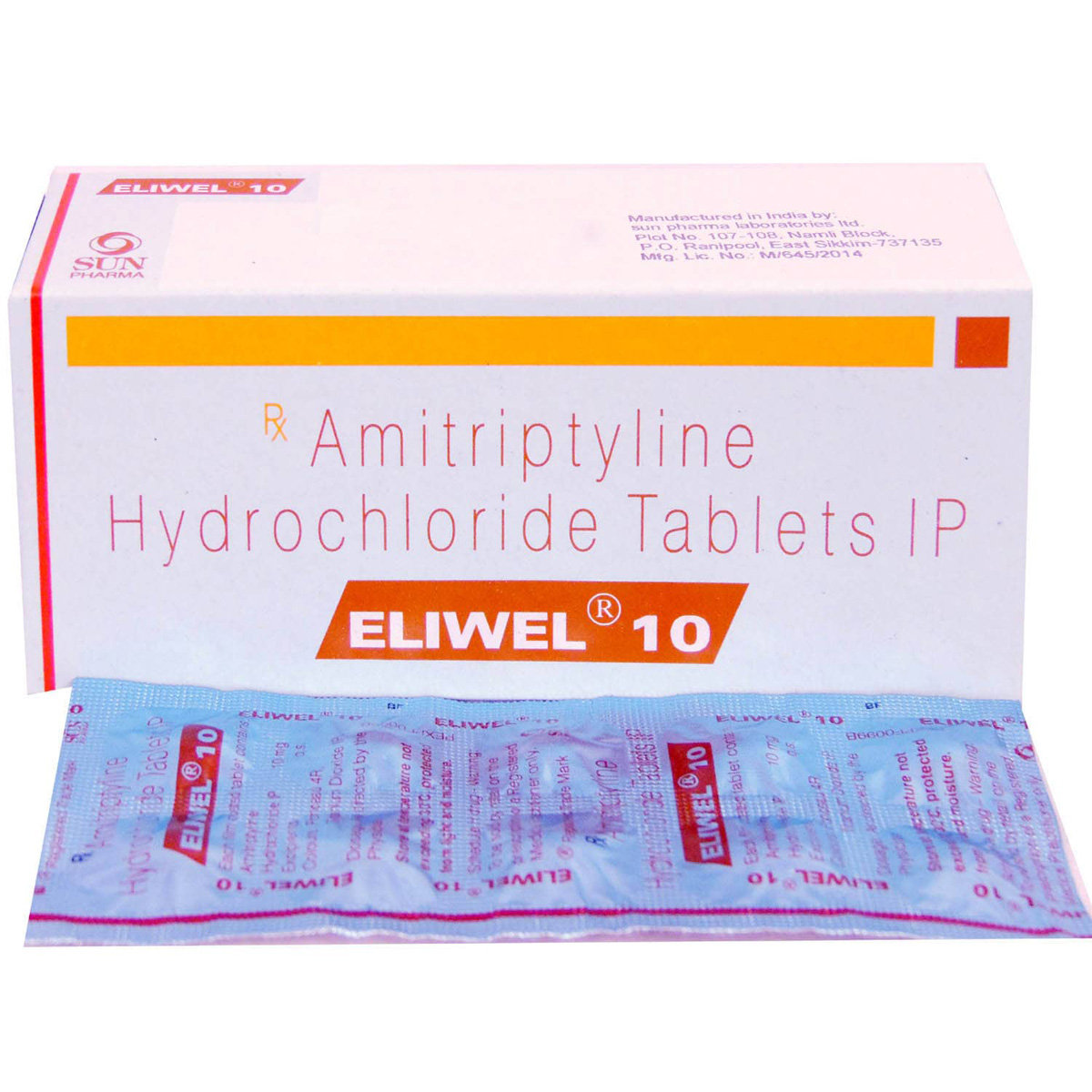Amitriptyline
About Amitriptyline
Amitriptyline belongs to a group of medicines called 'tricyclic antidepressants' used to treat depression, neuropathic pain, chronic tension-type headache, and migraine in adults. Additionally, Amitriptyline is also used to treat bedwetting at night in children aged 6 years and above. Depression is a mood disorder that affects a person's daily life described as feelings of sadness, loss, or anger.
Amitriptyline contains Amitriptyline that works by affecting certain chemical messengers (serotonin, norepinephrine) in the brain which communicate between brain cells, thereby helping in the regulation of mood and preventing depression. Besides this, Amitriptyline also the transmission of pain signals, thereby provides relief from neuropathic pain.
You are advised to take Amitriptyline for as long as your doctor has prescribed it for you depending on your medical condition and response to the treatment. In some cases, you may experience certain common side-effects such as sleepiness, drowsiness, headache, irregular heartbeat, dry mouth, constipation, nausea, weight gain, slurred or slow speech, and congested nose. Most of these side-effects do not require medical attention and will resolve gradually over time. However, you are advised to talk to your doctor if you experience these side-effects persistently.
To treat your condition effectually, continue taking Amitriptyline for as long as your doctor has prescribed. Do not take Amitriptyline if you are pregnant or breastfeeding unless prescribed by the doctor. Amitriptyline causes drowsiness, sleepiness and dizziness, do not drive unless you are alert. Amitriptyline can be given to children over 6years if prescribed by the doctor for bedwetting. Amitriptyline should not be given to children for treating depression or neuropathic pain. Avoid consuming alcohol along with Amitriptyline as it could lead to increased drowsiness and dizziness. Keep your doctor informed about your health condition and medicines to rule out any side-effects.
Uses of Amitriptyline
Medicinal Benefits
Amitriptyline belongs to a group of medicines called tricyclic antidepressants. Amitriptyline is used to treat depression, neuropathic pain, chronic tension-type headache, and migraine in adults. Amitriptyline is also used to treat bedwetting at night in children aged 6 years and above. Amitriptyline works by affecting certain chemical messengers (serotonin and/or norepinephrine) in the brain which communicate between brain cells, thereby helps in regulating mood and treats depression. Amitriptyline prevents the transmission of pain signals, thereby provides relief from neuropathic pain.
Directions for Use
Storage
Side Effects of Amitriptyline
- Sleepiness
- Drowsiness
- Headache
- Irregular heartbeat
- Dry mouth
- Constipation
- Nausea
- Weight gain
- Slurred or slow speech
- Congested nose
Drug Warnings
Do not take Amitriptyline if you are allergic to any of its contents if you recently had a heart attack, or heart problems, are taking other antidepressants like isocarboxazid, phenelzine, selegiline, tranylcypromine or have taken them in the last 14 days, have severe liver disease or if you have taken moclobemide (used to treat depression and social anxiety). Inform your doctor before taking Amitriptyline if you have heart rhythm problems or hypotension. Consult your doctor immediately if you have suicidal thoughts such as killing or harming yourself. Do not take Amitriptyline if you are pregnant or breastfeeding unless prescribed. Amitriptyline causes drowsiness and dizziness, do not drive unless you are alert. Amitriptyline can be given to children above 6 years if prescribed by the doctor for treating bedwetting. Amitriptyline should not be given to children for treating depression or neuropathic pain. Avoid consuming alcohol along with Amitriptyline as it could lead to increased drowsiness and dizziness. Rise slowly from sitting or lying position as Amitriptyline causes orthostatic hypotension (sudden lowering in blood pressure leading to dizziness on standing).
Drug Interactions
Drug-Drug Interactions: Amitriptyline may have interaction with pain killers (tramadol, trazodone, hydrocodone, oxycodone, acetaminophen), an antidepressant (bupropion, duloxetine, fluoxetine, sertraline), antihistamine (diphenhydramine, cetirizine), sedatives (zolpidem), muscle relaxant (cyclobenzaprine), anti-convulsant (gabapentin, lamotrigine, escitalopram, pregabalin, topiramate), anti-thyroid (levothyroxine), and anti-anxiety (alprazolam).
Drug-Food Interactions: Avoid consuming alcohol along with Amitriptyline as it may increase the sedative effects.
Drug-Disease Interactions: Amitriptyline may have interactions with disease conditions such as heart problems, anticholinergic effects, depression, seizure disorders, bone marrow suppression, diabetes, schizophrenia, bipolar disorder, acute alcohol intoxication, glaucoma, thyroid problems, pheochromocytoma, neutropenia, kidney and liver problems.
Drug-Drug Interactions Checker List:
Safety Advice

Alcohol
unsafeAvoid consumption of alcohol while taking Amitriptyline as it may cause an increased sedative effect.

Pregnancy
cautionAvoid taking Amitriptyline if you are pregnant unless prescribed by a doctor. Please consult your doctor if you have any concerns regarding this, your doctor will prescribe only if the benefits outweigh the risks.

Breast Feeding
cautionConsult your doctor before taking Amitriptyline; your doctor will decide whether Amitriptyline can be taken by breastfeeding mothers or not.

Driving
unsafeAmitriptyline causes sleepiness, dizziness and drowsiness. Do not drive or operate machinery if you experience these symptoms.

Liver
cautionDose adjustment may be needed in patients with liver impairment. Please consult your doctor if you have a liver impairment or any concerns regarding this.

Kidney
cautionDose adjustment may be needed in patients with kidney impairment. Please consult your doctor if you have kidney impairment or any concerns regarding this.

Children
cautionAmitriptyline can be given to children above 6 years if prescribed by the doctor for treating bedwetting. Amitriptyline should not be given to children for treating depression or neuropathic pain.
Habit Forming
Diet & Lifestyle Advise
- Maintain a healthy diet and exercise regularly helps in improving overall health and boosts self-esteem.
- Regularly attend therapy sessions.
- Perform meditation and yoga. This helps in relieving stress and provides relaxation.
- Follow a regular sleep pattern to improve the amount and quality of sleep you get.
- Include foods rich in omega fatty acids such as fish, nuts, fresh fruits, vegetables and olive oils.
- Neurotransmitters are made up of amino acids. Amino acid-rich foods such as meat, dairy products, and certain fruits and vegetables help in proper maintenance of neurotransmitters.
- Complex carbohydrates help in stimulating serotonin (a feel-good neurotransmitter). These include whole grains, legumes, spinach, broccoli, oranges and pears.
- Exercising helps in the production of the body’s natural antidepressants. It also helps in relieving stress, improving mood, boosts self-esteem, and provides restful sleep.
- Avoid smoking and alcohol consumption.
- Learn about your condition, understand the risk factors and follow the doctor’s treatment plan.
Patients Concern
Disease/Condition Glossary
Depression: It is a mood disorder characterised by the feeling of sadness, unhappiness, anger, hopelessness or loss that interferes with a person’s daily activities. Depression can also influence some chronic health conditions and relationships. The exact cause of depression is unknown, but it may be associated with mental problems, trauma, family history, drugs use, and medical conditions.
FAQs
Amitriptyline works by affecting certain chemical messengers (serotonin and/or norepinephrine) in the brain which communicate between brain cells, thereby helps in regulating mood and treats depression.
Amitriptyline prevents the transmission of pain signals, thereby provides relief from neuropathic pain.
Amitriptyline causes sleepiness, drowsiness, and dizziness. Do not drive or operate machinery if you are experiencing these symptoms.
Amitriptyline causes weight gain due to increased appetite. Eat a healthy diet and exercise regularly to maintain a healthy weight.
Do not discontinue Amitriptyline without consulting your doctor as it could lead to recurring symptoms. To treat your condition effectually continue taking Amitriptyline for as long as prescribed. Do not be reluctant to speak with your doctor if you feel any difficulty while taking Amitriptyline.
Amitriptyline may cause decreased sex-drive, problems with erection and orgasm. Consult your doctor if you have any concerns regarding this.
Dry mouth could be a side-effect of Amitriptyline. Limiting caffeine intake, avoiding smoking and mouthwashes containing alcohol, drinking water regularly, and chewing sugar-free gum/candy might help in stimulating saliva and thereby prevents drying of the mouth.
Yes, orthostatic hypotension could be a side-effect of Amitriptyline. Orthostatic hypotension is a sudden lowering in blood pressure leading to dizziness on standing. If you experience this, do not try to stand up suddenly or start walking, instead lie down and get up slowly only when you feel better. People taking Amitriptyline are advised to regularly monitor their blood pressure levels to avoid such unpleasant events.





